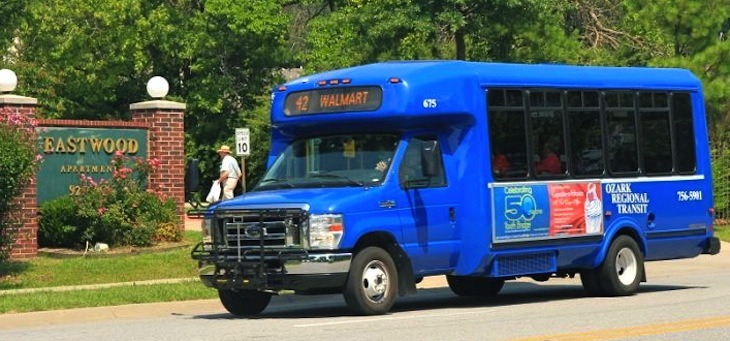Business leaders from North Carolina, Indianapolis to discuss support for transit programs
by April 2, 2018 4:51 pm 443 views

Transit supporters from the Raleigh-Durham area in North Carolina and Indianapolis will soon be in Northwest Arkansas to explain why businesses leaders there have looked to improve mobility.
Joe Milazzo, executive director of the Regional Transportation Alliance business coalition serving the Raleigh-Durham area, and Mark Fisher, chief policy officer for the Indy Chamber, will speak at Growing Mobility for a Growing Region — The Business Case for Transit — Part Three: How and Why the Raleigh-Durham and Indianapolis Business Communities Support Transit taking place from 4:30 to 6:30 p.m. April 19 at the Northwest Arkansas Board of Realtors in Lowell. The event, which is the third of a four-part speaker series, will be hosted by Northwest Arkansas Regional Planning Commission and Urban Land Institute — Northwest Arkansas and will include a question and answer session.
Milazzo and Fisher plan to talk about their region’s transit systems and how they are being improved. Like Northwest Arkansas, both regions have worked to establish a bus rapid transit service. Also, Northwest Arkansas and the Raleigh-Durham area have similarities such as they’re polycentric and have interstates connecting the cities, Milazzo said. Northwest Arkansas has Interstate 49 and the Raleigh-Durham area, Interstate 40.
The area approved several sales taxes over multiple years for transit and related infrastructure, including plans to establish a bus rapid transit system. Along with discussing this, he plans to talk about the existing highway system and the past, present and future of transit for the area.
Like Milazzo, this will be Fisher’s first time in Northwest Arkansas, and Fisher, who’s also a board member for transit provider IndyGo, explained the evolution of transit systems in Indianapolis.
In an economic study to determine return on investment, it found that transportation infrastructure spending had the highest return on investment, but Indianapolis didn’t have a dedicated funding source for transit. However, in November 2016, voters in Marion County, Ind., approved a 0.25% income tax increase to provide this dedicated funding, he said. The City-County Council of Indianapolis-Marion County approved the tax in early 2017.
Proceeds from the tax will pay to enhance the capacity of the existing bus transit system by 70%. The new system would increase operations to 20 hours per day and the bus frequency for regular bus routes to 15 minutes and 10 minutes for bus rapid transit, Fisher said. Also, the system will operate on a grid instead of a hub and spoke system, allowing riders to reach destinations with more direct routes. Transit consultant Jarrett Walker designed the system, which is expected to be operational in mid-2019.
Tim Conklin, transportation programs manager for Northwest Arkansas Regional Planning Commission, said he learned about Fisher after asking for speaker recommendations from Walker, who was the first speaker in the series on mobility. Walker also worked in the Raleigh-Durham area, in his research, Conklin found out about Milazzo. Conklin also found that the two speakers are from areas that are among the top 20 locations for the next Amazon headquarters.
As a co-host of the event, Urban Land Institute-Northwest Arkansas is promoting the event, said Keaton Smith, who serves on the organization’s steering committee.
“ULI NWA is a group of local real estate and land use professionals who want to help solve regional land use problems, creating opportunity for all. ULI does not have a position on transit yet, but regional transportation is a challenge for any growing region. We are studying the problem and intend to remain engaged in the conversation. We welcome input from others in the business community and the community at large,” he said. “We stand ready to leverage the expertise of our membership and our ability to convene diverse stakeholders to help this conversation move forward.”
Northwest Arkansas has added more than 100,000 people in the past decade, Conklin said, and through the four-part speaker series, he hopes to learn more about what other growing regions are doing to retain talent and compete nationally and globally.
The fourth event in the series on mobility is expected to take place in either May or June and will include speakers from neighboring regions, such as Tulsa, Oklahoma City and Kansas City, along with a panel discussion including Ozark Regional Transit and Razorback Transit, he said.
The Walton Family Foundation is sponsoring the speaker series and provided a nearly $80,000 grant for it. Link here to sign up for the April 19 event.
